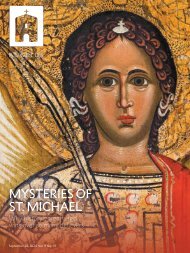Angelus News | September 23, 2022 | Vol. 7 No. 19
On the cover: The logo used for the Catechism of the Catholic Church, published in 1992, is adapted from an image found in the Catacombs of Domitilla in Rome thought to symbolize “the rest and the happiness that the soul of the departed finds in eternal life.” Ahead of the 30th anniversary of the catechism’s release next month, Russell Shaw explains on Page 10 what prompted the Church to undertake such an immense project. On Page 26, Greg Erlandson offers a perspective on the text’s relevance to ordinary Catholics — like his own mother.
On the cover: The logo used for the Catechism of the Catholic Church, published in 1992, is adapted from an image found in the Catacombs of Domitilla in Rome thought to symbolize “the rest and the happiness that the soul of the departed finds in eternal life.” Ahead of the 30th anniversary of the catechism’s release next month, Russell Shaw explains on Page 10 what prompted the Church to undertake such an immense project. On Page 26, Greg Erlandson offers a perspective on the text’s relevance to ordinary Catholics — like his own mother.
You also want an ePaper? Increase the reach of your titles
YUMPU automatically turns print PDFs into web optimized ePapers that Google loves.
POPE WATCH<br />
Advertise<br />
with us<br />
ANGELUS<br />
Build a loyal<br />
customer base<br />
Contact Jim Garcia at<br />
213.637.7590 or<br />
jagarcia@angelusnews.com<br />
Hearing when God speaks<br />
The following is adapted from a<br />
catechesis on discernment by the Holy<br />
Father given during his weekly General<br />
Audience on Wednesday, Sept. 7.<br />
One of the most instructive<br />
examples on discernment is<br />
offered to us by St. Ignatius of<br />
Loyola. He is at home convalescing,<br />
after injuring a leg in battle. To dispel<br />
the boredom, he asks for something<br />
to read. He loves tales of chivalry, but<br />
unfortunately only the lives of saints<br />
can be found at home.<br />
In the course of reading, he begins to<br />
discover another world, a world that<br />
conquers him and seems to compete<br />
with that of knights. He is fascinated by<br />
the figures of St. Francis and St. Dominic,<br />
and feels the desire to imitate<br />
them. But the world of chivalry also<br />
continues to exert its fascination on<br />
him. And so, within himself he feels<br />
this alternation of thoughts — those<br />
of chivalry and those of the saints —<br />
which seem to equate to one another.<br />
St. Ignatius, however, also begins<br />
to perceive some differences. In his<br />
autobiography (written in the third<br />
person), he writes: “When he thought<br />
of worldly things, it gave him great<br />
pleasure, but afterward he found himself<br />
dry and sad. But when he thought<br />
of journeying to Jerusalem, and of<br />
living only on herbs and practicing<br />
austerities, he found pleasure not only<br />
while thinking of them, but also when<br />
he had ceased.”<br />
There is a history that precedes one<br />
who discerns. Because discernment<br />
is not a sort of oracle or fatalism, or<br />
something from a laboratory, like<br />
casting one’s lot on two possibilities.<br />
The great questions arise when we<br />
have already traveled a stretch of the<br />
road in life, and it is to that journey we<br />
must return to understand what we are<br />
looking for.<br />
St. Ignatius of Loyola had his first<br />
experience of God by listening to<br />
his own heart, which presented him<br />
with a curious reversal: things that<br />
were attractive at first sight left him<br />
disillusioned, whereas in others, less<br />
dazzling, he found lasting peace. We<br />
too have this experience; very often<br />
we begin to think about something,<br />
and we stay there, and then we end<br />
up disappointed. Instead, if we … do<br />
something good and feel something<br />
of happiness, it is an experience that is<br />
entirely our own.<br />
This is what we must learn: to know<br />
what is happening, what decision<br />
to make, to make a judgment on a<br />
situation, one must listen to one’s own<br />
heart.<br />
Another important aspect of discernment<br />
is the apparent randomness in<br />
the events of life: everything seems to<br />
arise from a banal mishap.<br />
God works through unplannable<br />
events that happen by chance, but by<br />
chance this happened to me, and by<br />
chance I met this person, by chance<br />
I saw this film. It was not planned<br />
but God works through unplannable<br />
events, and also through mishaps. In<br />
a mishap, what is God saying to you?<br />
What is life telling you there? He who<br />
says to you: “But I wasn’t expecting<br />
this.” Is it life speaking to you, is it the<br />
Lord speaking to you, or is it the devil?<br />
Discernment is the aid in recognizing<br />
the signals with which the Lord makes<br />
himself known in unexpected, even<br />
unpleasant situations. … May the<br />
Lord help us to hear our hearts and see<br />
when it is he who acts and when it is<br />
not, and it is something else.<br />
Papal Prayer Intention for <strong>September</strong>: We pray that the<br />
death penalty, which attacks the dignity of the human<br />
person, may be legally abolished in every country.<br />
2 • ANGELUS • <strong>September</strong> <strong>23</strong>, <strong>2022</strong>


















